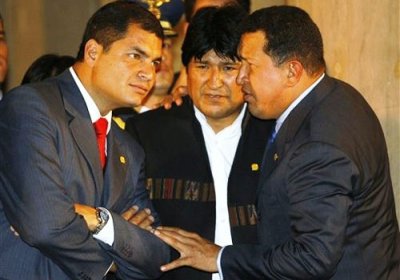The Bolivarian Alliance for the Peoples of Our America (ALBA) released a statement on June 28 reaffirming its commitment to the Honduran people’s struggle for a return to democracy one year after the coup that overthrew president Manuel Zelaya.
ALBA is an anti-imperialist alliance founded in 2004 by Cuba and Venezuela. Its members include Bolivia, Ecuador, Nicaragua, Dominica, Saint Vincent and the Grenadines, and Antigua and Barbuda.
Under Zelaya, Honduras joined ALBA, which suspended Honduras’s membership after the coup. The regime has since withdrawn from ALBA.
843
A nearly two-month-long student strike that shut down all 11 campuses of the University of Puerto Rico (UPR) ended in a decisive victory for the students.
The students’ inspiring unity, determination and creativity serve as a magnificent example of how to fight and win in the face of neoliberal attempts to balance budgets in this era of global austerity.
The strike began April 21 as a 48-hour stoppage at UPR’s main campus of Rio Piedras to protest US$100 million in budget cuts, a sharp increase in student fees and the administration’s unwillingness to negotiate with student activists.
In 2006, the Victorian government committed to introducing a “landmark” Climate Change Bill. At this time, there was growing momentum around the world for legislation that would cut greenhouse gas emissions. This momentum was largely in response to the glacial pace of the international climate change negotiations.
The Punjab government has been given three months to decide the fate of 68,000 hectares of agricultural land. The land is owned by the government and has been cultivated by tenants for more than 100 years.
The tenants have demanded land ownership rights. Despite government promises, the land has not been allotted to them.
The three months’ notice was given at the end of a huge peasants rally on June 29 at Okara. The rally was organised by the Punjab Tenants Association (AMP) on the eve of the anniversary of 10 years of the tenants’ struggle for land ownership rights.
The Queensland Crime and Misconduct Commission (CMC) recently released a report highly critical of the police investigation into the case of Palm Island Aboriginal man Mulrunji Doomadgee, who died in police custody in November 2004. The CMC gave police commissioner Bob Atkinson 14 days to take disciplinary action against six officers involved.
Atkinson was due to make his decision by July 2, but an injunction filed on behalf of the officers extended the deadline until July 6
While G20 leaders barely made mention of the climate crisis at the June 26-27 G20 summit in Toronto, Pablo Solon, Bolivia’s United Nations ambassador, was in town to encourage action on the “Cochabamba protocols”.
It is no surprise that Solon, also Bolivia’s chief climate negotiator, was not on the list of special invitees to G20 meetings. In April, Solon and the Bolivian government he represents organised the World People’s Conference on Climate Change and the Rights of Mother Earth in Cochabamba.
The number of “High Net Worth Individuals” (HNWIs) in Australia — those with more than US$1 million in investable assets, excluding the family home — soared to 173,600 last year. This, according to the latest World Wealth Report, was an increase of 34.4% on the year before.
The June 30 Sunshine Coast Daily said: “What's more impressive is Australia's ranking in the global population of HNWIs. Out of 71 countries, Australia has the 10th biggest population of HNWIs in the world, in front of Brazil and just behind that millionaire's paradise of Switzerland.”
The detention of about 150 asylum seekers in a disused mining camp at Leonora, near Kalgoorlie in remote Western Australia, is a return to the dark days of previous Coalition prime minister John Howard.
Under Howard, asylum seekers were detained at a disused defence department shooting range at Woomera in South Australia. Both cases involve refugees being detained at remote prison camps and only allowed out accompanied by detention centre staff.
25 intrepid activists left on July 2 for Alice Springs as part of a Justice Ride to show solidarity with Aboriginal people fighting against the NT intervention. They will take part in the Defending Indigenous Rights: Land Law Culture convergence in Alice Springs from July 6 to 9.
Just after becoming prime minister, Julia Gillard told media on June 24 she could understand “the anxiety and indeed fears that Australians have when they see [refugee] boats”. She did not cite evidence for this claim. She said that, as PM, she would explain to the Australian people “what we are doing to manage our borders and what we are doing to manage asylum seeker flows”.
National Tertiary Education Union (NTEU) members at the University of New South Wales (UNSW) began industrial action on June 30 to pressure management to reach agreement with the union on a range of claims. They want reinstatement of job security protections for contract research staff; improved conditions for casual and fixed-term staff; Indigenous employment targets and an increase in paid parental leave from 26 to 36 weeks.
A Short Border Handbook
By Gazmend Kapllani
Portobello Books 2009
159 pages
Review by Alex Miller
This book, which the author describes as “part autobiography, part fiction”, is hard to assess. Each chapter is divided into two parts. The first part tells the story of a man (presumably Kapllani himself) who crosses into Greece from Albania when the border between those two countries opened in 1991. The second part consists of “philosophical” ruminations on issues raised by the story of the first part.
- Previous page
- Page 3
- Next page










